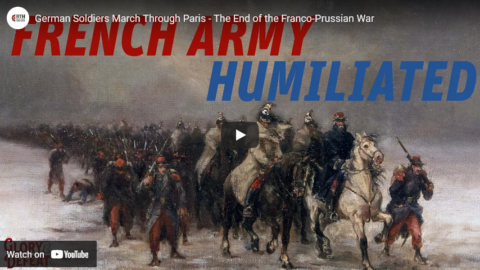Real Time History
Published 27 Jan 2022https://patreon.com/realtimehistory – support future Real Time History series on Patreon
The end of the Franco-Prussian War is marked by humiliation for France. German soldiers march into Paris and the French Army of the East under Bourbaki flees to neutral Switzerland to surrender there.
» THANK YOU TO OUR CO-PRODUCERS
John Ozment, James Darcangelo, Jacob Carter Landt, Thomas Brendan, Kurt Gillies, Scott Deederly, John Belland, Adam Smith, Taylor Allen, Rustem Sharipov, Christoph Wolf, Simen Røste, Marcus Bondura, Ramon Rijkhoek, Theodore Patrick Shannon, Philip Schoffman, Avi Woolf,» OUR PODCAST
https://realtimehistory.net/podcast – interviews with historians and background info for the show.» LITERATURE
Arand, Tobias: 1870/71. Der Deutsch-Französische Krieg erzählt in Einzelschicksalen. Hamburg 2018Bauer, Gerhard u.a. (Hrsg.): Ausst.-Kat. MHM Dresden‚ Krieg – Macht – Nation. Wie das deutsche Kaiserreich entstand. Dresden 2020
Bolek, Nina: “Die Regelungen des Frankfurter Friedensvertrages zur Kriegerbestattung”, in: Das Schlachtfeld von Woerth – Geschichtsort, Erinnerungsort, Lernort, hrsg. v. T. Arand und Ch. Bunnenberg. Münster. 2012: 109-130
Buk-Swienty, Tom: Feuer und Blut. Hauptmann Dinesen. Hamburg 2014
Gouttman, Alain: La grande défaite. 1870-1871. Paris 2015
Joland, Gérard: “La variole et la guerre de 1870”, in Les Tribunes de la santé 33/4 (2011): 25-30
Tomasetti, Philippe: “L’œvre des tombes et des prières et l’érection des premiers monuments commémoratifs français de la guerre de 1870-1871”, in: L’Outre-Fôret 155 (2011): 3-17
» SOURCES
Deuerlein, Ernst: Die Gründung des Deutschen Reichs 1870/71 in Augenzeugenberichten. Gerlingen 2011 (Neuauflage)Engels, Friedrich: Der Deutsch-Französische Krieg. Sechzig Artikel aus der “Pall Mall Gazette”. Berlin (Ost) 1957
Gerstäcker, Friedrich: “Um Paris herum. IV. Die Brücke von Sèvres”, in: Die Gartenlaube, Heft 11 (1871). SW. 183-186
Goncourt, Edmond de: Journal des Goncourts. II.1. 1870-1871. Paris 1890
Pietsch, Ludwig: Von Berlin bis Paris. Kriegsbilder 1870-1871. Berlin 1871
Reich-Gesetzblatt Nr 26. 1871. Berlin 1872
Russell, William Howard: My diary during the last great war. London 1874
Schellendorf, Paul Bronsart von: Geheimes Kriegstagebuch 1870-71, hrsg. v. Peter Rassow. Bonn 1954
Zeitz, Karl: Kriegserinnerungen eines Feldzugsfreiwilligen aus den Jahren 1870 und 1871. Altenburg 1905
» OUR STORE
Website: https://realtimehistory.net»CREDITS
Presented by: Jesse Alexander
Written by: Cathérine Pfauth, Prof. Dr. Tobias Arand, Jesse Alexander
Director: Toni Steller & Florian Wittig
Director of Photography: Toni Steller
Sound: Above Zero
Editing: Toni Steller
Motion Design: Philipp Appelt
Mixing, Mastering & Sound Design: http://above-zero.com
Maps: Battlefield Design
Research by: Cathérine Pfauth, Prof. Dr. Tobias Arand
Fact checking: Cathérine Pfauth, Prof. Dr. Tobias ArandChannel Design: Battlefield Design
Contains licensed material by getty images
All rights reserved – Real Time History GmbH 2022
January 29, 2022
German Soldiers March Through Paris – The End of the Franco-Prussian War
Viewing with alarm — Substack is a place where “misinformation is allowed to flourish”
Matt Taibbi posts, appropriately, on Substack about demands by others to force Substack to censor writers and their content:
Substack is home to tens of thousands of writers and over a million paying subscribers, quadruple last year’s total of 250,000. The sites range from newsletters for comics enthusiasts to crypto news to recipe ideas. Like the Internet as a whole, it’s basically a catalogue of everything.
Still, panic campaigns in legacy press consistently focus on handfuls of sites, and with impressive dishonesty describe them as representative. I was particularly struck by a recent Mashable article that talked about a supposed “backlash” against Substack’s “growing collection of anti-trans writers”, which seemed to refer to Jesse Singal (who is no such thing) and Graham Linehan and — that’s it. Substack is actually home to more trans writers than any other outlet, but to the Scolding Class, that’s not the point. The company’s real crime is that it refuses to submit to pressure campaigns and strike off Wrongthinkers.
Substack is designed to be difficult to censor. Because content is sent by email, it’s not easy to pressure platforms to zap offending material. It doesn’t depend on advertisers, so you can’t lean on them, either. The only real pressure points are company executives like Hamish McKenzie and Chris Best, who are now regular targets of these ham-fisted campaigns demanding they discipline writers.
The latest presents Substack as a place where, as Mashable put it, “COVID misinformation is allowed to flourish”. The objections mainly center around Joseph Mercola, Alex Berenson, and Robert Malone. There are issues with the specific critiques of each, but those aren’t the point. Every one of these campaigns revolves around the same larger problem: would-be censors misunderstanding the basic calculus of the freedom of speech.
Even in a society with fairly robust protections, as ours once was, the most dangerous misinformation is always, without exception, official.
As the old joke from the Cold War had it, never believe any rumour until it’s been officially denied.
Censors have a fantasy that if they get rid of all the Berensons and Mercolas and Malones, and rein in people like Joe Rogan, that all the holdouts will suddenly rush to get vaccinated. The opposite is true. If you wipe out critics, people will immediately default to higher levels of suspicion. They will now be sure there’s something wrong with the vaccine. If you want to convince audiences, you have to allow everyone to talk, even the ones you disagree with. You have to make a better case. The Substack people, thank God, still get this, but the censor’s disease of thinking there are shortcuts to trust is spreading.
Miscellaneous Myths: King Midas
Overly Sarcastic Productions
Published 22 Oct 2021Ahh, Midas. Shockingly one of the least Problematic ancient greek kings, and certainly one of the funniest to read about. Bizarrely good at surviving direct confrontations with temperamental gods!
PARTIAL TRACKLIST: Starfall, Flight of the Silverbird, Sky Becomes Water, Starfall
“Sneaky Snitch” Kevin MacLeod (incompetech.com)
Licensed under Creative Commons: By Attribution 3.0
http://creativecommons.org/licenses/b…Our content is intended for teenage audiences and up.
PATREON: https://www.Patreon.com/OSP
PODCAST: https://overlysarcasticpodcast.transi…
DISCORD: https://discord.gg/osp
MERCH LINKS: http://rdbl.co/osp
OUR WEBSITE: https://www.OverlySarcasticProductions.com
Find us on Twitter https://www.Twitter.com/OSPYouTube
Find us on Reddit https://www.Reddit.com/r/OSP/
QotD: English patriotism
In England patriotism takes different forms in different classes, but it runs like a connecting thread through nearly all of them. Only the Europeanized intelligentsia are really immune to it. As a positive emotion it is stronger in the middle class than in the upper class – the cheap public schools, for instance, are more given to patriotic demonstrations than the expensive ones – but the number of definitely treacherous rich men, the Laval-Quisling type, is probably very small. In the working class patriotism is profound, but it is unconscious. The working man’s heart does not leap when he sees a Union Jack. But the famous “insularity” and “xenophobia” of the English is far stronger in the working class than in the bourgeoisie. In all countries the poor are more national than the rich, but the English working class are outstanding in their abhorrence of foreign habits. Even when they are obliged to live abroad for years they refuse either to accustom themselves to foreign food or to learn foreign languages. Nearly every Englishman of working-class origin considers it effeminate to pronounce a foreign word correctly. During the war of 1914-18 the English working class were in contact with foreigners to an extent that is rarely possible. The sole result was that they brought back a hatred of all Europeans, except the Germans, whose courage they admired. In four years on French soil they did not even acquire a liking for wine. The insularity of the English, their refusal to take foreigners seriously, is a folly that has to be paid for very heavily from time to time. But it plays its part in the English mystique, and the intellectuals who have tried to break it down have generally done more harm than good. At bottom it is the same quality in the English character that repels the tourist and keeps out the invader.
George Orwell, “The Lion And The Unicorn: Socialism and the English Genius”, 1941-02-19.






